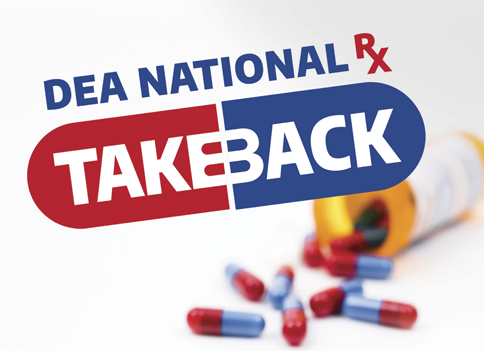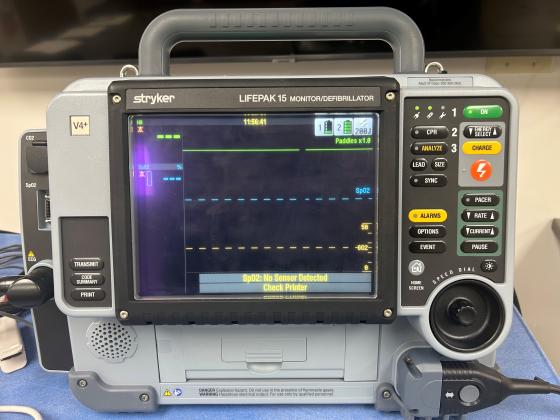Dispose of unwanted medications on Saturday’s Take Back Day
Twice a year, on National Prescription Drug Take Back Day, law enforcement, the U.S. Drug Enforcement Administration and the medical community encourage people to turn in and dispose of expired, unwanted and unused prescription medications. By encouraging the public to remove unneeded medications from their homes, medication misuse and opioid addiction can be prevented. Studies show more than seven million Americans currently abuse prescription drugs -- and what isn’t available can’t be abused. Saturday, April 27 is this spring’s day. The initiative is organized to make medicine cabinets countrywide a safer place.
Locally, here are a list of drive-up sites you can bring those unwanted pills and patches (note: liquids, needles and syringes cannot be accepted) on Saturday between 10 a.m. and 2 p.m., and the agency involved.
Kissimmee, HCA Florida Osceola Hospital, Kissimmee Police Department;
St. Cloud, Save-A-Lot, (916 13th Street), St. Cloud Police Department;
St. Cloud, Walgreens, U.S. Highway 192 and Narcoossee Road, St. Cloud Police Department;
Poinciana, HCA Florida Poinciana Hospital, Osceola County Sheriff's Office;
UCF Lake Nona Hospital;
Outside of Osceola County, most municipal police departments will accept medications.
St. Cloud hospital using new defibrillators
Orlando Health St. Cloud Hospital has announced it will begin using defibrillators with an enhanced energy shock capability that can improve the odds of reviving difficult-to-defibrillate patients who experience sudden cardiac arrest.
The automated external defibrillator (AED) can deliver up to up to 360 joules when low-energy shocks fail to resuscitate a patient. The biphasic defibrillator sends the energy current in two directions: it travels to the heart and back through it a second time as it returns to its source.
“This defibrillator gives our team the ability to deliver more powerful energy, and this saves lives,” said Joel Santora, MD, MBA, critical care physician & chief quality officer, Orlando Health St. Cloud Hospital.
The defibrillator detects and analyzes the heart’s rhythm and can sense if a shock is needed through electrode pads placed on the patient’s chest. It can help correct an arrhythmia – an irregular heartbeat – and restore a normal heartbeat if the heart suddenly stops beating.
The device also calculates SpO2, the measurement of blood that is saturated with oxygen, and ETCO2, the level of carbon dioxide released at the end of an exhaled breath. There is an alarm that occurs when 30 seconds have passed since a patient’s last detected breath.
The defibrillator is also able to stream a patient’s vital signs, waveforms and other critical data to the hospital for valuable insights throughout the patient’s journey.
“These additional features are cutting-edge technology to enhance the cardiac care for our community,” Santora said.
St. Cloud earns FEDC award
The City of St. Cloud’s website earned an Florida Economic Development Council (FEDC) Innovation in Marketing award. Each year FEDC accepts nominations for excellence in project development that results in job creation, capital investment, and increased wages in a Florida community
Four Osceola food locations receive grant for refrigerators
Second Harvest Food Bank of Central Florida has received a $27,000 grant from Duke Energy Foundation through the Powerful Communities program. The funding expanded the cold storage capacity at eight of Second Harvest’s community feeding partners, allowing them to distribute even more perishable foods to Osceola County neighbors.
The Osceola County facilities that received the new Turbo Air refrigerator through this grant included The Altar Community Church and Impacto 7 in St. Cloud and the Salvation Army and Clarita’s House Outreach Ministry in Kissimmee.
State inspection uncovers thousands of hemp products targeting children
Florida Commissioner of Agriculture Wilton Simpson announced that Florida Department of Agriculture and Consumer Services (FDACS) inspectors uncovered over 186,000 packages of hemp products that were designed to target children at a South Florida distribution site. To prevent any potential harm to consumers, inspectors issued stop-sale orders for 186,377 packages of hemp products – many of which were euphoric, high-potency products – and 644 packages containing synthetic cannabinoids, specifically "THC-O" and “HHCO.”
“The discovery of over 186,000 packages of hemp products targeting children serves as a stark reminder of the importance of protecting the safety and well-being of our communities – especially from euphoric, high-potency hemp products that can pose serious health risks when ingested by children,” Simpson said. “As we continue to navigate the evolving landscape of hemp and cannabinoid products, we remain steadfast in our mission to uphold the highest standards of safety and accountability. This enforcement action is a testament to that commitment, and we will not hesitate to take further measures as necessary to ensure the well-being of all Floridians.”
Since July 2023, FDACS inspectors have issued stop-sale orders for over 631,000 hemp products designed to target children and more than 420,000 packages containing illegal synthetic cannabinoids, state officials said.
During the 2023 legislative session, SB 1676 was passed that added age requirements for the purchase of hemp products intended for human consumption, prohibited marketing and packaging that targets children, mandated that products sold in Florida be packaged in a safe container, and holds ingested hemp products to the same health and safety standards as other food products.





